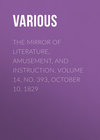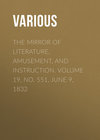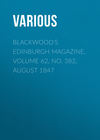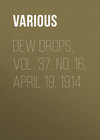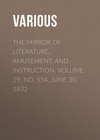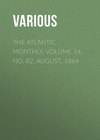Loe raamatut: «The Mirror of Literature, Amusement, and Instruction. Volume 14, No. 393, October 10, 1829», lehekülg 3
Sturminster.
RURIS.
A SEA-SIDE MAYOR
(For the Mirror.)
At Yarmouth, a person is selected from among those employed on the beach during the fishing season, who is denominated the Sea-side Mayor, his office being to inflict certain punishments and penalties on such fishermen as are found guilty of pilfering herrings, &c.
The fishing commences in the latter part of September, a day or two previous to which a procession goes round the town, the object and order of which are as follow:—
A person grotesquely attired, and carrying a trident, to represent Neptune,3 precedes, followed by four or five men bearing colours with inscriptions of "Prosperity to the town of Yarmouth." "Death to our best Friends," (meaning the herrings), "Success to the Herring Fishery," &c. Then follows a band of musicians. The Sea-side Mayor (dressed as a sailor, and wearing a gilt chain around his neck) brings up the rear, in a handsome boat built for the occasion, and borne on the shoulders of ten or a dozen men, wearing white ribands on the breast of their jackets and on their hats.
In this order the procession calls at the shops of different tradespeople, or any one at all connected with the herring fishery, where they solicit contributions, and those who are disposed to be liberal, are honoured with a tune from the musicians, and the cheering of the mayor. After parading the town they retire to a tavern to dinner. A great number of French and Dutch fishing boats resort to Yarmouth at the herring fishing, and on the Sunday previous to the 21st of September, "Dutch Fair," as it is denominated, is held on the beach, and presents a novel and interesting appearance.
From twenty to thirty of their flat bottomed boats are run on shore at high water, and as the tide recedes, are left high and dry. Dutch pipes, dried flounders, wooden shoes, apples, and gingerbread, are then offered for sale, and if the weather be fine, the beach is thronged with company, many of whom come from a great distance.
W. S. L.
SAXON NAMES OF THE MONTHS
(For the Mirror.)
December, which stood first, was styled "Mid-winter monath." January was "Aefter-yule," or after Christmas. February "Sol-monath," from the returning sun. March "Rhede, or Rhede monath," rough, or rugged month. April "Easter monath," from a favourite Saxon goddess, whose name we still preserve. May was "Trimilchi," from the cows being then milked thrice in the day. June "Sere monath," dry month. July "Maed monath," the meads being then in their bloom. August was "Weod monath," from the luxuriance of weeds. September "Haerfest monath." October they called "Winter fylleth," from winter approaching with the full moon of that month. And lastly, November was styled "Blot monath," from the blood of the cattle slain that month, and stored for winter provision. Verstegan names the months somewhat differently.
P.T.W.
CURIOUS BEQUEST
(For the Mirror.)
John Wardell, by will, dated August 29, 1656, gave to the Grocers' Company, a tenement known by the name of the White Bear, in Walbrook, to the intent that they should yearly, within thirty days after Michaelmas, pay to the churchwardens of St. Botolph, Billingsgate, £4. to provide a good and sufficient iron and glass lantern, with a candle, for the direction of passengers, to go with more security to and from the water side, all night long, to be placed at the north-east corner of the parish church of St. Botolph, from the Feast Day of St. Bartholomew to Lady Day; out of which sum £1. is to be paid to the sexton for taking care of the said lantern.
H.B.A.
SLEEPERS IN CHURCH
(For the Mirror.)
Richard Davey, in 1659, founded a free-school at Claverley, Salop, and directed to be paid yearly the sum of eight shillings to a poor man of the said parish, who should undertake to awaken sleepers, and to whip out dogs from the church of Claverley, during divine service.
H.B.A.
THE SELECTOR;
AND LITERARY NOTICES OF NEW WORKS
THE EPPING HUNT
By Thomas Hood, Esq
We remember the appearance of Mr. Hood's first work—Odes and Addresses to Great People; and many a reviewer and printer rejoiced in the light columns which it furnished them by way of extract. They made up very prettily beside a theological critique, a somewhat lumbering book on political economy, or a volume of deep speculations on geology. Hood's little book, a mere thin pocket size, soon grew into notice and favour; the edition ran off, and one or two more impressions have followed. A host of imitators soon sprung up, but we are bound to acknowledge that from the above to the present time, Mr. Hood has kept the field—the Pampa of pun—to himself, and right sincerely are we obliged for the many quips and quiddities with which he has enabled us to garnish our pages. We say garnish, for what upon earth can better resemble the garnishings of a table than Mr. Hood's little volumes: how they enliven and embellish the feast, like birds and flowers cut from carrots, turnips, and beet-root; parsley fried crisp; cascades spun in sugar, or mouldings in almond paste, at a pic-nic supper party.
We love a good motto, and one like Mr. Hood's speaks volumes:
"HUNTS ROASTED"—
Next comes an advertisement of the author's endeavour to record a yearly revel (the Epping Hunt,) already fast hastening to decay. Mr. Hood is serious, as the following epistle will show:—
"It was penned by an underling at the Wells, a person more accustomed to riding than writing."
"Sir,—About the Hunt. In anser to your Innqueries, their as been a great falling off laterally, so much so this year that there was nobody allmost. We did a mear nothing provisionally, hardly a Bottle extra, wich is a proof in Pint. In short our Hunt may be sad to be in the last Stag of a Decline.
"I am, Sir,
"With respects from
"Your humble Servant,
"BARTHOLOMEW RUTT."
Then begins the tale.
John Huggins was as bold a man
As trade did ever know,
A warehouse good he had, that stood
Hard by the church of Bow.
There people bought Dutch cheeses round,
And single Glos'ter flat,—
And English butter in a lump,
And Irish—in a pat.
Six days a week beheld him stand,
His business next his heart,
At counter with his apron tied
About his counter-part.
The seventh in a sluice-house box,
He took his pipe and pot;
On Sundays for eel-piety,
A very noted spot.
Huggins gets "Epping in his head," and resolves to go to "the Hunt."
Alas! there was no warning voice
To whisper in his ear,
Thou art a fool in leaving Cheap
To go and hunt the deer!
No thought he had of twisted spine,
Or broken arms or legs;
Not chicken-hearted he, altho'
'Twas whisper'd of his eggs.'
Ride out he would, and hunt he would,
Nor dreamt of ending ill;
Mayhap with Dr. Ridout's fee,
And Surgeon Hunter's bill.
To say the horse was Huggins' own,
Would only be a brag;
His neighbour Fig and he went halves,
Like Centaurs, in a nag.
And he that day had got the gray,
Unknown to brother cit;
The horse he knew would never tell,
Altho' it was a tit.
A well bred horse he was I wis,
As he began to show,
By quickly "rearing up within
The way he ought to go."
And so he jogged to Tot'n'am Cross,
An ancient town well known,
Where Edward wept for Eleanor
In mortar and in stone
A royal game of fox and goose,
To play on such a loss;
Wherever she set down her orts,
Thereby he put a cross.
Now Huggins had a crony here,
That lived beside the way;
One that had promised sure to be
His comrade for the day.
His friend had gone to Enfield Chase:
Then Huggins turned his horse's head,
And crossed the bridge of Lea.
Thence slowly on thro' Laytonstone,
Past many a Quaker's box,—
No friends to hunters after deer,
Tho' followers of a Fox.
And many a score behind—before—
The self-same route inclin'd,
And minded all to march one way,
Made one great march of mind.
Gentle and simple, he and she,
And swell, and blood, and prig;
And some had carts, and some a chaise,
According to their gig.
Some long-ear'd jacks, some knacker's hacks,
(However odd it sounds,)
Let out that day to hunt, instead
Of going to the hounds!
And some had horses of their own,
And some were forc'd to job it;
And some, while they inclin'd to Hunt,
Betook themselves to Cob-it.
All sorts of vehicles and vans,
Bad, middling, and the smart;
Here roll'd along the gay barouche,
And there a dirty cart!
And lo! a cart that held a squad
Of costermonger line;
With one poor hack, like Pegasus,
That slav'd for all the Nine!
And so he paced to Woodford Wells,
Where many a horseman met,
And letting go the reins, of course,
Prepared for heavy wet.
And lo! within the crowded door,
Stood Rounding, jovial elf;
Here shall the Muse frame no excuse,
But frame the man himself.
The portrait is excellent:
A snow white head a merry eye,
A cheek of jolly blush;
A claret tint laid on by health,
With master reynard's brush.
A hearty frame, a courteous bow,
The prince he learn'd it from:
His age about three-score and ten,
And there you have Old Tom.
In merriest key I trow was he,
So many guests to boast;
So certain congregations meet,
And elevate the host.
They start—
But Huggins, hitching on a tree,
Branched off from all the rest.
Then comes the motley mob—
Idlers to wit—no Guardians some,
Of Tattlers in a squeeze;
Ramblers, in heavy carts and vans,
Spectators up in trees.
Butchers on backs of butcher's hacks,
That shambled to and fro'!
Bakers intent upon a buck,
Neglectful of the dough!
Change Alley Bears to speculate,
As usual, for a fall;
And green and scarlet runners, such
As never climb'd a wall!
'Twas strange to think what difference
A single creature made;
A single stag had caused a whole
Stagnation in their trade.
The deer is brought–
Now Huggins from his saddle rose,
And in the stirrups stood;
And lo! a little cart that came
Hard by a little wood.
In shape like half a hearse,—tho' not
For corpses in the least;
For this contained the deer alive,
And not the dear deceased!
Robin bounds out, and the hunt starts: Huggins—
Away he went, and many a score
Of riders did the same,
On horse and ass—like high and low
And Jack pursuing game.
Good lord! to see the riders now,
Thrown off with sudden whirl,
A score within the purling brook,
Enjoy'd their "early purl."
A score were sprawling on the grass,
And beavers fell in show'rs;
There was another Floorer there,
Beside the Queen of Flowers!
Some lost their stirrups, some their whips,
Some had no caps to show;
But few, like Charles at Charing Cross,
Rode on in Statue quo.
"O, dear! O, dear!" now might you hear,
"I've surely broke a bone;"
"My head is sore,"—with many more
Such speeches from the thrown.
Away they went then dog and deer,
And hunters all away.—
The maddest horses never knew
Mad staggers such as they!
Some gave a shout, some roll'd about,
And antick'd as they rode,
And butchers whistled on their curs,
And milkmen tally-ho'd!
About two score there were, not more,
That gallopped in the race;
The rest, alas! lay on the grass,
As once in Chevy Chase!
And by their side see Huggins ride,
As fast as he could speed;
For, like Mazeppa, he was quite
At mercy of his steed.
No means he had, by timely check,
The gallop to remit,
For firm and last, between his teeth,
The biter held the bitt.
Trees raced along, all Essex fled
Beneath him as he sate,—
He never saw a county go
At such a county-rate!
"Hold hard! hold hard! you'll lame the dogs:"
Quoth Huggins, "so I do,—
I've got the saddle well in hand,
And hold as hard as you!"
And now he bounded up and down,
Now like a jelly shook:
Till bump'd and gall'd—yet not where Gall,
For bumps did ever look!
And rowing with his legs the while,
As tars are apt to ride;
With every kick he gave a prick,
Deep in the horse's side!
But soon the horse was well avenged,
For cruel smart of spurs,
For, riding through a moor, he pitched
His master in a furze!
Where sharper set than hunger is
He squatted all forlorn;
And like a bird was singing out
While sitting on a thorn!
Right glad was he, as well as might be.
Such cushion to resign:
"Possession is nine points," but his
Seemed more than ninety nine.
Yet worse than all the prickly points
That enter'd in his skin,
His nag was running off the while
The thorns were running in!
A jolly wight comes by upon
A sorry mare, that surely came
Of pagan blood and bone;
For down upon her knees she went,
To many a stock and stone!
Now seeing Huggins' nag adrift,
This farmer, shrewd and sage,
Resolv'd by changing horses here,
To hunt another stage!
So up on Huggins' horse he got,
And swiftly rode away,
While Huggins mounted on the mare
Done brown upon a bay!
And off they set, in double chase,
For such was fortune's whim,
The Farmer rode to hunt the stag,
And Huggins hunted him.
And, far remote, each scarlet coat
Soon flitted like a spark,—
Tho' still the forest murmur'd back
An echo of the bark.
But sad at soul John Huggins turn'd:
No comfort he could find.
Whilst thus the "Hunting Chorus" sped
To stay five bars behind.
For tho' by dint of spur he got
A leap in spite of fate—
Howbeit there was no toll at all,
They could not clear the gate.
